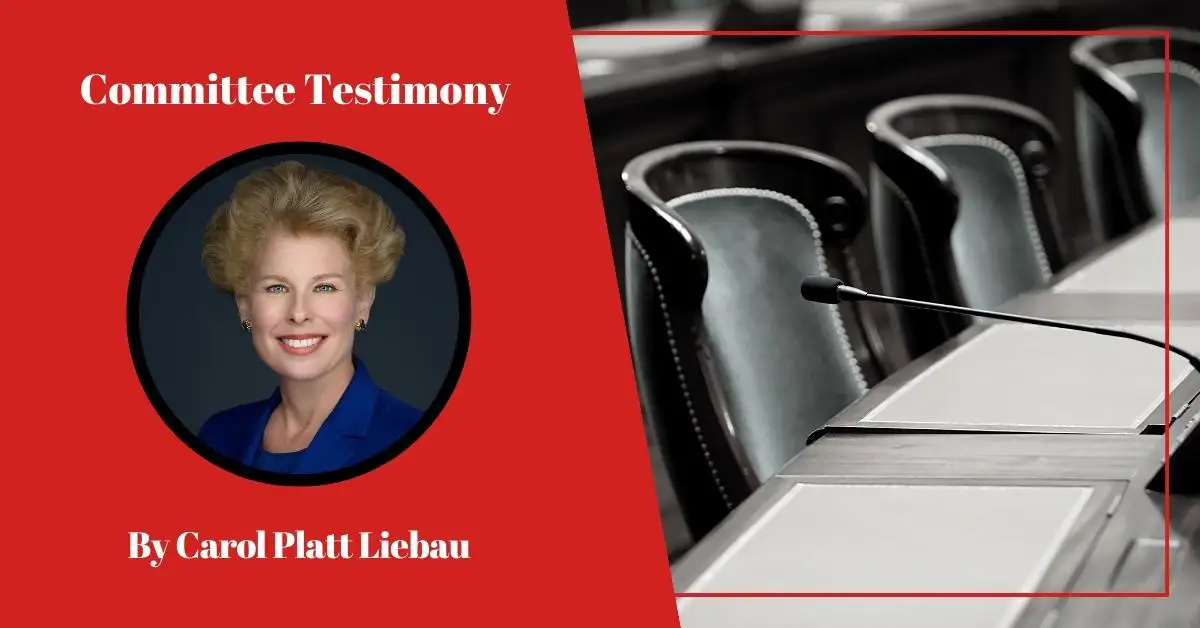Testimony in Opposition to Proposed H.B. No. 5113 AN ACT INCREASING THE HIGHEST MARGINAL RATE OF THE PERSONAL INCOME TAX AND ESTABLISHING A CAPITAL GAINS SURCHARGE TO PROVIDE FUNDING FOR CERTAIN CHILD-RELATED, MUNICIPAL AND HIGHER EDUCATION INITIATIVES
Submitted by Carol Platt Liebau, President
March 12, 2024
Thank you for the opportunity to testify before the Labor Committee in opposition to S.B. 35 and H.B. 5113. My name is Carol Platt Liebau, and I am the President of Yankee Institute, a non-profit public policy organization in Hartford dedicated to empowering Connecticut residents to strengthen our communities and build a vibrant, hopeful future.
Every state looking for new revenue sources faces calls to “tax the rich.” The question is whether doing so is practical — and whether it’s right.
In plucking Connecticut’s golden geese, let’s not make them fly the coop. Connecticut already disincentivizes the wealthy from living here. We’re the only state with a gift tax, and we have a mansion and luxury tax, as well. The rich are dissuaded from dying here, too — Connecticut is one of only 16 states with an estate tax.
The rich are the most mobile people there are. If they leave altogether, they stop paying any taxes. And that significantly erodes funding for all the programs government wants to fund.
Our state already has 63,990 part time residents. Time they’re spending in other states is time they might be here — shopping in our stores, supporting our churches and non-profits, being part of our communities. There’s no reason to encourage more of our people to seek tax shelter in states like Florida or South Carolina.
So in our eagerness to extract more income taxes from our most affluent residents, it’s important not to push them out of Connecticut. Finding that balance is particularly delicate when it comes to the income tax. The 2024 tax incidence report showed the top 2 percent of filers paid 40% of state income tax. Fully 13.2 percent of income tax revenue came from just 478 individuals.
In recent years, Connecticut has found itself increasingly dependent on revenues from the wealthy. As California’s experience demonstrates, such dependence can breed boom-and-bust cycles as the income of the ultrawealthy drastically fluctuates on a year-by-year basis. Rather than increasing our dependence on unpredictable tax revenues from a few hundred highly mobile households, our state would be far better served by seeking out stabler sources of revenue and spending more modestly.
A capital gains surcharge makes Connecticut especially unattractive to the wealthy. When an asset is sold, the capital gain is taxed an additional amount beyond what would ready be assessed from the personal income tax. Raising the tax creates an even stronger incentive for investors to retain underperforming investments when better opportunities exist. This encourages the wealthy to avoid businesses that are worthier of investment, in favor of poorly performing businesses they are already invested in. Such a policy creates slower economic growth and reinforces the popular image of a Connecticut unfriendly toward good business.
These are the practical objections to the proposed taxes. But there are moral ones, as well. The answer to all Connecticut’s self-inflicted fiscal problems can’t be found in someone else’s pocket. Connecticut is a high-income per capita state and imposes one of America’s most burdensome tax systems. It collects $30.9 billion in taxes. Yet it has still managed to accumulate the highest state debt per resident. Perhaps it’s time to look for ways to exercise more fiscal discipline, instead of constantly seeking new ways to tax state residents.
As long as it’s been gained honestly, the fact that one state resident earns more than another is not, in itself, a justification for taxing what he or she has away. According to Forbes, most millionaires are self-made. Eighty percent of them grew up in families at or below middle-income levels. Only two percent inherited their wealth from their families.
Rather than being viewed as assets to be exploited, Connecticut’s affluent residents should be seen as partners in helping change Connecticut for the better. Our wealthiest residents are extraordinarily generous in pursuing the common good. According to the Chronicle of Philanthropy’s database, Connecticut’s highest income residents have made gifts between $1 million to $35 million, accounting for over $292 million dollars to charities around Connecticut in the last 5 years.
Connecticut is blessed with beautiful topography, a great location and a well-educated population. Rather than finding new ways to tax our millionaire households more, it’s time to start considering policies that will turn more middle-class households into millionaires. The resulting prosperity — and taxes flowing from it — will accrue to the benefit of all Connecticut’s people, high- and low-income alike.
Respectfully submitted,
Carol Platt Liebau
President
[email protected]

